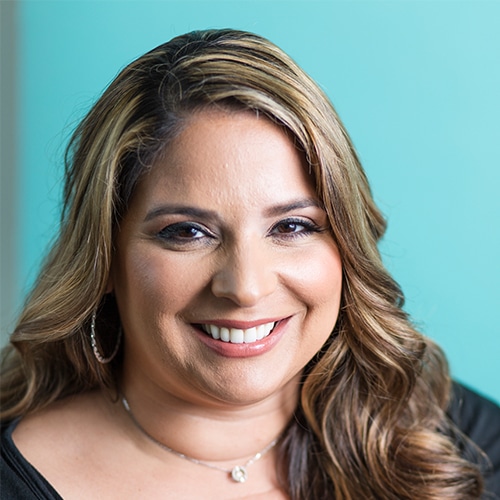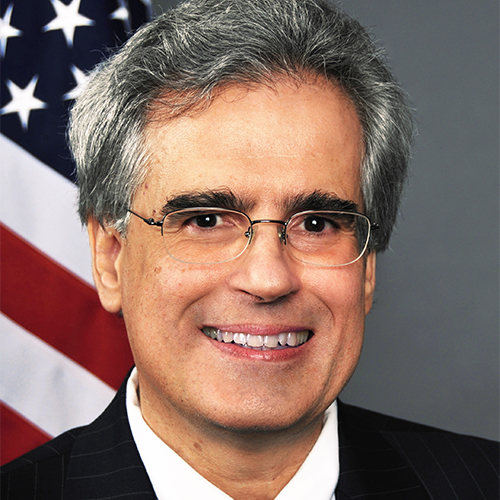|
Getting your Trinity Audio player ready...
|
Board Snapshot
Ford Motor Company
Mutual of America
Kimberly Casiano began her path to the boardroom when she was an undergraduate at Princeton University where she studied politics and Latin American history. Although there were not many Latino students in her class—she was one of only two from Puerto Rico—her Latin American studies courses were almost entirely composed of Latino students. “At that time, Hispanics were not high on the radar screen of most non-Hispanics as being an important economic or political group,” she says.
To liven up the discussions in one of these courses, Casiano regularly argued against one of the few non-Latino students in her class, even when she agreed with his statements. She later learned he was Bill Ford, the great-grandson of Ford Motor Company founder Henry Ford.
By the time Ford and Casiano reconnected two decades after graduating, Ford had become chairman of the board at Ford Motor Company. When he asked Casiano to consider joining the board, he hearkened back to their college days. “He asked if I hadn’t changed my style since Princeton,” she says. “He wanted a Hispanic director for the board—but not a token Hispanic.”
Casiano hadn’t changed her style. After graduating from Princeton, she became the youngest woman at the time to receive an MBA from Harvard Business School. She went on to found Caribbean Marketing Overseas Corporation, a consulting firm that worked with the US Agency for International Development and the US Department of Commerce on economic development projects in the Caribbean and Central America.
Casiano then joined—and later became president of—Casiano Communications, a publishing company started by her father that produced Spanish-language magazines. “I’m not a product of corporate America,” she says. “I’m a product of an entrepreneurial family, so the idea of a board of directors of a public company was really not in my realm of experience.”
“I’m not a product of corporate America. I’m a product of an entrepreneurial family, so the idea of a board of directors of a public company was really not in my realm of experience.”
Despite this, she joined the board of Ford Motor Company in 2003, becoming the first Hispanic woman on the board of a top-five Fortune 100 company. Three years later, she joined the board of Mutual of America, a retirement products and insurance coverage provider.
During her tenure at Ford, the company went through a particularly challenging period of reinvention. Along with balancing day-to-day issues, such as compliance and investor relations, the board was helping to re-engineer the company’s strategy. “Boards can get lost in the myriad of time-consuming, bureaucratic things that we need to do,” Casiano says. “During that period, there were so many things to discuss that the importance of being able to communicate in a concise, succinct way became especially important.”
Among the board’s challenges was cutting costs while maintaining the company’s commitment to corporate social responsibility. “A company can have a heart, and a company can be socially responsible, committed, and passionate while, at the same time, being profitable,” Casiano says. “I look for those kind of companies.”
It was this balance of business and heart that drew Casiano to both Mutual of America and Ford. The former was created to establish retirement plans for workers in the nonprofit sector who were not eligible for social security benefits at the time. “Their core—their very DNA—has to do with making the world a better place as well as maximizing success,” she says.
Similarly, Ford’s legacy began with Henry Ford’s philosophy of paying factory workers a fair wage, and today, Bill Ford is committed to environmentalism. “He was talking about [environmentalism] before people in corporate America were even mentioning it,” Casiano says. “He was very involved in changing manufacturing processes at Ford to more environmentally sustainable processes.”
In establishing her own legacy, Casiano seeks to help build a case for women and minorities in the boardroom—one that goes beyond tokenism and demonstrates proven growth and shareholder value.
As the Hispanic market in the United States has grown, she has seen diversity initiatives shift from legislated programs, such as affirmative action, to a business interest in a market that now has significant economic and political power. “No longer is it simply a feel-good decision on the part of corporate America to pay attention to the Hispanic market,” she says. “It’s a business decision that makes sense.”
As a board member, Casiano helps set a culture that values diversity at Ford, at Mutual of America, and at the companies where her colleagues are executives. “They’re going to sit back, and they’re going to say, ‘Gee, do I have any Hispanics on my board? Do I have women on my board?’” she says.
When Casiano visited Harvard Business School in 2017 to give a talk to Latino students, she stood in front of a room of future leaders, men and women alike. “When I entered Harvard Business School in the late 1970s, I was one of the few women—never mind Hispanic women,” she says. “Change is happening as we speak. I think that there will be some very different numbers ten years from now.”
Thoughts from Guest Editor Victor Arias
“I’ve had the pleasure of working with this dynamo. She exudes courage and is an absolute catalyst for change. Kim has a powerful voice in the boardroom and is highly effective! Felicidades Kim!”
Ford Motor Company congratulates board member Kimberly Casiano for her recognition as one of the “Best of the Boardroom.” We join Hispanic Executive in celebrating your leadership and dedication. Thank you for your insights and contributions to our governing board.

